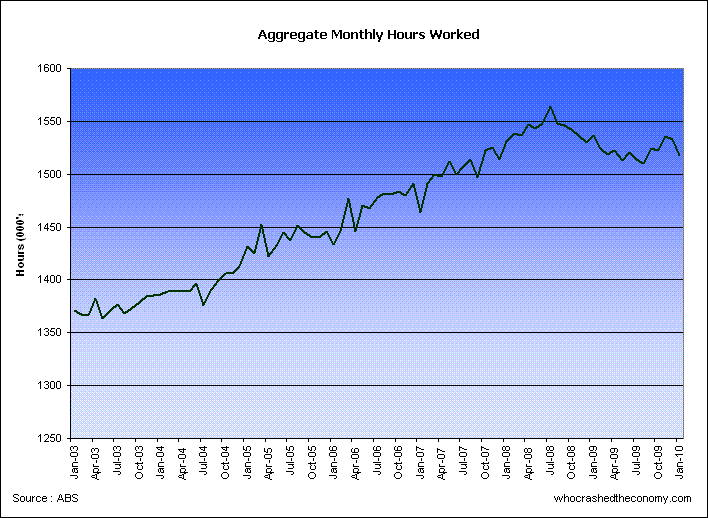With the onset of an election, the government has seized at data from the Australian Bureau of Statistics showing Australia’s unemployment rate is trending down from 5.5 percent in December to 5.3 percent in January. But while more Australian’s are in work, is the result really as rosy as the government makes out?
Looking closely at the data, the number of hours worked continues to fall after a little blip late last year. So while the number of people in work has increased, they are working less hours which can’t exactly help the mortgage repayments or contribute to more discretionary spending.

The Sydney Morning Herald also points out that two thirds of the 52,700 newly created jobs or three quarters of the jobs created since October have been male.
”When men outnumber women so much it has to be an industry story,” said a Deutsche Bank economist, Phil O’Donohue. ”The building industry is the obvious candidate. Since mid-last year almost 8000 primary schools have been building halls and computer labs and libraries with $14 billion allocated under the Primary Schools for the 21st Century program,” he said.
”I think in January with school about to come back the tradies put on more blokes. It has to be the stimulus. Away from mining, private non-residential construction is flat.”
Until recent, I have been working in the security industry and can confirm Phil’s suspicions. We have had builders ring up after as many employees we have to get jobs done for the BER (Building the Education Revolution) program before the school year started.
The question is, is this work sustainable? What happens when the BER program comes to an end?
» Male employment raised by building stimulus – The Sydney Morning Herald, 13th February 2010.

Random thoughts:
1) If the jobs created are not permanent, these employees may very well find getting a mortgage difficult.
2 The governments unemployment data is undoubtedly ‘cooked’. Many part-time employees probably counted as full-time.
3) Govt’s ads on Sydney Radio station plugging 50% off housing stamp duties today.
4) Interesting times, thanks for the informative site.
5) I’ll hop on off to Steve Keens blog now for a read 🙂
I went to look at some display homes in new developments in the Wyndham Vale and Tarneit on Sunday. Some very interesting observations.
1. The ‘stages’ of an estate they are releasing now are as little as 7-10 blocks! Typically when a housing estate releases a stage they would be lots of maybe 20-30 blocks, not less than 10. We arrived at 2pm on Sunday afternoon and we were the first people that had been in the land office all weekend – demand for house and land packages in the outer west (at the prices they are asking) has all but dried up.
2. The second developer I went to (Burbank) was the same – very small releases. The salesmen went as far as saying they are doing smaller releases to ensure that prices do not fall.
3. How long can the big developers hold onto the land without developing it given companies like Woolworths, Aldi, etc. have already build a supermarket that is currently surrounded by paddocks? Before the stimulus a lot of the developers had cash flow problems from lack of land turnover, so maybe this will start again.
Quality of jobs is much more important than hours worked. The quality of the job is derived from the sophistication of the job and the inherent value of that work. In Australia and much of the rest of the world, things are heading towards zero. Labour is not worth what it used to be and will continue to become more and more worthless. People are becoming irrelevant to the economy.
The amount of people sitting around on 70k a year where I work doing nothing is testament to that.
Australia doesn’t make much of value anymore apart from resources.
The harsh reality is that most companies ‘could’ clean out 20-30% of its salaried costs (wiping our senior leaders, useless roles and people, etc) and still make as much profit.
The rebound so quickly from the financial crises meant that most large corporate companies didn’t do this, the cushy jobs remained, and thus our phantom economy continues